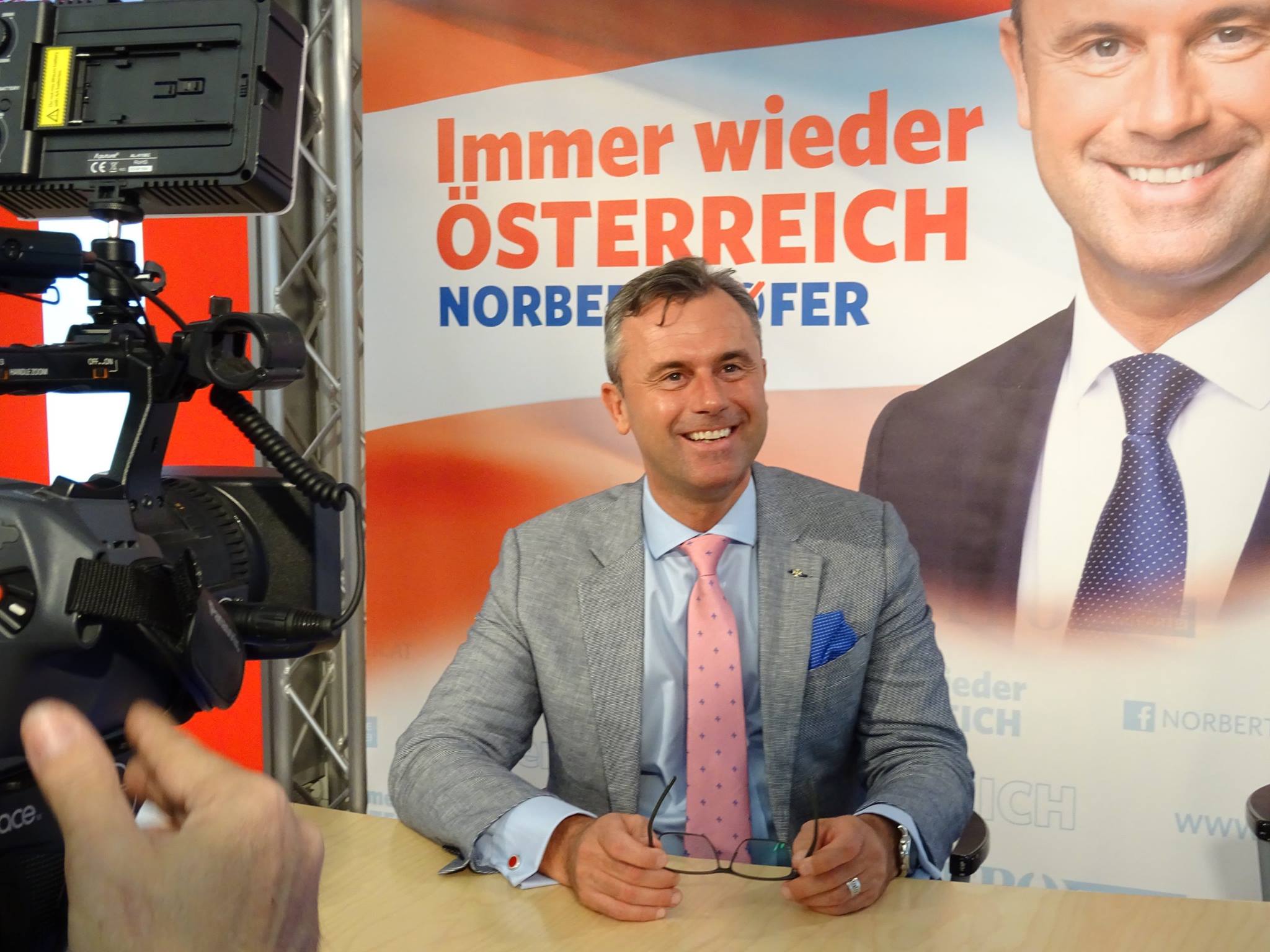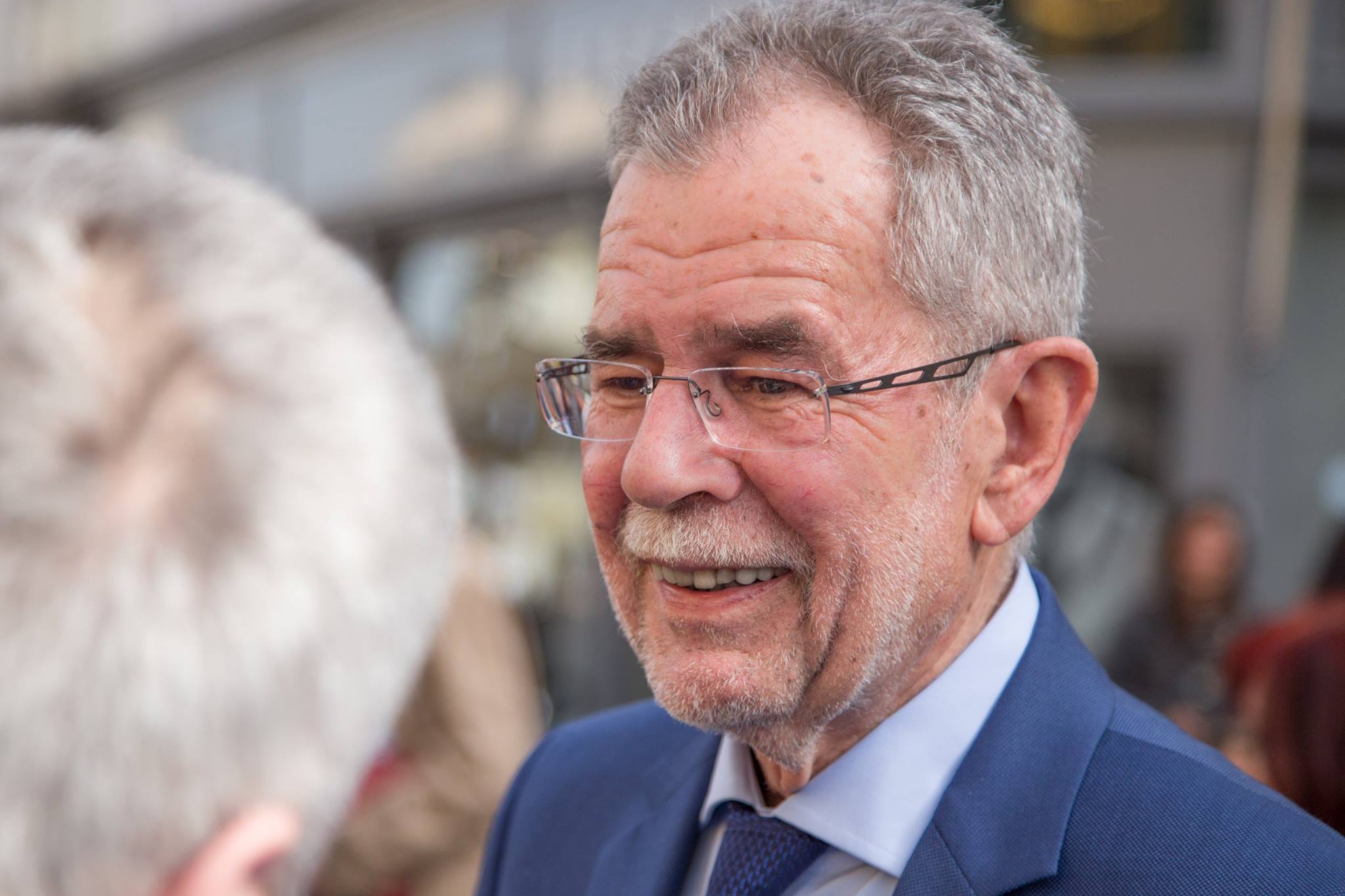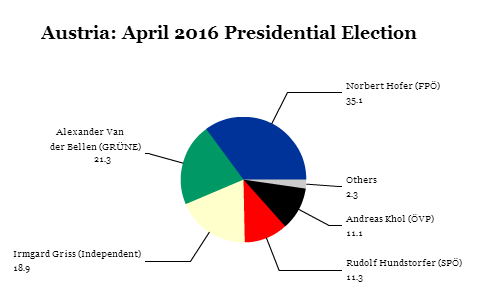
On a day when Serbians reelected their pro-European government in landslide, the spotlight suddenly fell on Austria instead.![]()
Norbert Hofer, the candidate of the anti-immigrant, far-right Freiheitliche Partei Österreichs (FPÖ, Freedom Party of Austria), easily won the first round of Austria’s presidential election, while the candidates of the two governing parties fell to fourth and fifth place.
Hofer’s first-round lead of more than 10% shocked not only Vienna, but the entire European Union.
At age 45, Hofer is not nearly as well known as some of the Freedom Party’s top officials, including its leader, Heinz-Christian Strache. But his fresh-faced appeal might have improved the party’s chances, in contrast to one of the FPÖ’s more established figures. Austria has admitted more refugees, on a per-capita basis, than even Germany, and Hofer spent much of his campaign trashing Austria’s willingness to pay more into the European Union than it receives in return, stoking anger over bailouts to Greece and other member-state with crippling debt.
In second place was Alexander Van der Bellen, an amicable 72-year-old economics professor and a former spokesperson from 1997 to 2008 of the Die Grünen – Die Grüne Alternative (Green Party). Polls leading up to Sunday’s vote consistently gave Van der Bellen a lead, adding to the shock value of Hofer’s robust victory. The winner of a May 22 runoff will replace Heinz Fischer, a social democrat, former president of the upper house of Austria’s parliament and former science minister in the 1980s, who has served as president since 2004. Needless to say, Fischer’s successor will not direct Austria’s policy.

Polls show that the runoff will be tight, but there’s a strong chance that the anti-Hofer vote will consolidate around Van der Bellen in the second round, not unlike the way the left and right united in France in 2002 to oppose Jean-Marie Le Pen in that country’s presidential runoff.
Unlike France, however, the stakes for Austria’s presidential runoff are much lower. Given the chiefly ceremonial role of the Austrian presidency, even a second-round triumph for Hofer would be more symbolic than substantive. Even if Van der Bellen can’t pick up enough right-leaning moderates to stop Hofer, it will not mean a hard-right turn for Austrian policy. It’s not even the first time a controversial figure has served as Austria’s president. Kurt Waldheim, Austria’s right-wing president from 1986 to 1992, became a controversial figure due to his role as an officer for the Wehrmacht in World War II, though he returned to Austrian politics after a decade as the secretary-general of the United Nations.
Instead, Hofer’s first-round victory is setting off alarms because the Freedom Party’s rise could scramble Austrian politics as the 2018 elections approach, which will determine who runs the next government, and it increasingly looks like the Freedom Party will play a starring role.
The FPÖ has steadily gained vote share in recent years, in part because of rising concerns over increased migration from elsewhere in the European Union and from the Middle East and Africa. Last September, the party made major strides in the state of Upper Austria, a postwar stronghold of the center-right Österreichische Volkspartei (ÖVP, Austrian People’s Party). In last October’s Vienna elections, the party also gave a fright to mayor Michael Häupl, and the center-left Sozialdemokratische Partei Österreichs (SPÖ, Social Democratic Party of Austria) in a city/state that has been a postwar stronghold for Austria’s social democrats. In the last national parliamentary elections in September 2013, the Freedom Party easily outpaced expectations. The three major parties — the Freedom Party, the People’s Party and the Social Democrats — all won between 21% and 27% of the vote.
Polls now show that if fresh national elections were held today, the Freedom Party could easily win. That doesn’t mean that Strache will necessarily become the next chancellor, but it could mean the return of a conservative coalition between the Freedom Party and the Austrian People’s Party, the controversial result of Austria’s 1999 and 2002 elections.
Sunday’s vote means that neither of Austria’s two major parties will hold the presidency for the first time since the end of World War II. But if there’s a moment when two-party politics died in Austria, it was in 1999 when the late Jörg Haider brought the Freedom Party into coalition with the Austrian People’s Party.
If the Freedom Party does win a clear victory as the leading party in Austria’s next elections (still a long way off), it may simply refuse to play junior partner again to the ÖVP. That might mean an even wider grand coalition government that includes Austria’s smaller parties, but it might also clear the path to a Strache chancellorship.
Following the 2013 elections, the People’s Party and the Social Democrats continued a ‘grand coalition’ government under center-left chancellor Werner Faymann. Austria has a long history of broad consensus politics and grand coalitions. But as the lines between the two major center-right and center-left parties have blurred, the Freedom Party has more easily emerged as the alternative to the two governing parties.
The electorate’s dwindling enthusiasm for the two governing parties seems clear enough from the presidential election — the SPÖ and the ÖVP together won just 22.4% of the vote. Of course, voters may be far likelier to register a protest vote in a more symbolic contest than in parliamentary elections. But they both managed to outpace the Freedom Party as recently as the May 2014 European parliamentary elections, which have become an opportunity for recent protest votes in the United Kingdom, France and elsewhere in western Europe.
That, in a nutshell, is why Hofer’s victory is so alarming — it’s the latest and clearest sign that an increasing number of Austrian voters are willing to support the Freedom Party.
